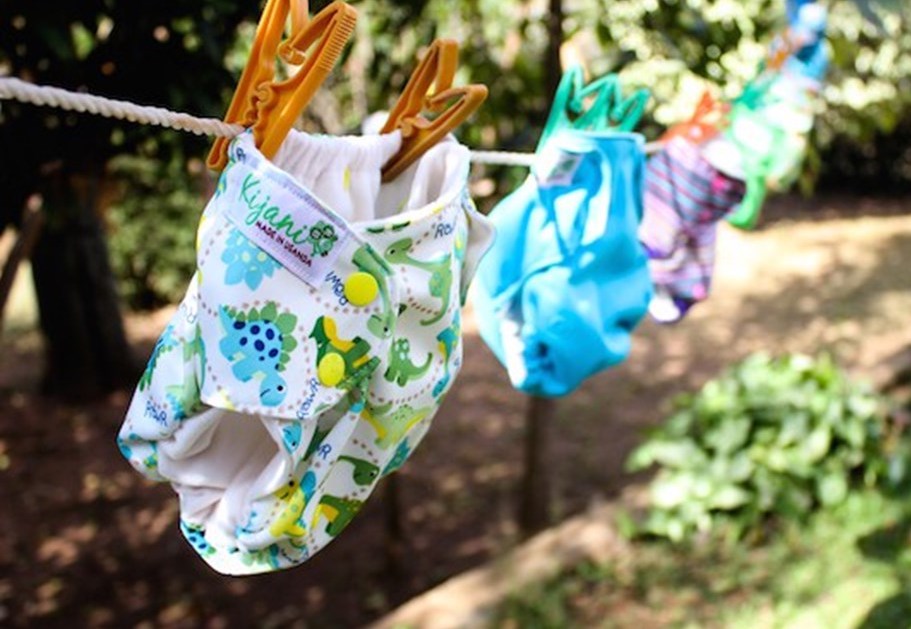ImpactAlpha, July 18 — Valerie Rogers Muigai began making cloth diapers in Uganda for her own children to save money and avoid the waste of disposables. After she started giving the colorfully designed nappies to friends as baby gifts, a network of customers grew and her hobby turned into a side hustle. Muigai launched Kijani Baby five years ago, and the former development worker now employs 13 people full time, including six tailors.
Kijani is the first investment of a new $500,000 “mini-fund” targeting women entrepreneurs in Ethiopia and Uganda from RENEW, an impact investment firm based in Addis Ababa. The deal was delayed when the Ethiopian government shut down the internet for 10 days after a group of soldiers staged a failed coup.
Up to now, RENEW has managed a network of 150 angel investors to coordinate a dozen investments of about $500,000 each into small and medium-sized businesses in Ethiopia. The new fund of “pooled capital” will cut smaller checks and invest exclusively in women-led companies. The firm expects two more deals to close in the next month and is finalizing due diligence on another two companies.
Female fund managers make the case for ‘gender alpha’ in emerging markets
Gender lens
The new fund is among a growing number of “gender lens” focused investment vehicles targeting female founders in emerging markets.
Africa is one of the only regions in the world where female business owners outnumber male owners. Yet, as is the case in most other parts of the world, women encounter more roadblocks than men as they attempt to grow their businesses. African women often find the doors of banks and traditional investment firms closed to them, in part because they’re typically running smaller companies that need smaller capital infusions.
In other words, fewer of women entrepreneurs are ready to absorb investments of half a million dollars, RENEW’s Laura Davis told ImpactAlpha. “Women have a harder time accessing banking relationships and supplier relationships,” said Davis, who founded RENEW with her husband Matt in 2012. “So we wanted to build an investment structure that works for women and supports them.”
New Jersey-native Muigai moved to Uganda with her husband Mugai Ndoka seven years ago. She launched Kijani, which means “green” in Swahili, after realizing that there were no washable diapers available on the Ugandan market. The company has two types of customers at the moment, middle-class Ugandan families looking for an affordable, environmentally friendly way to diaper their babies, and the NGOs and social businesses it partners with to provide cloth diapers to low-income Ugandan families.
“This investment will be instrumental to scale our production and improve our systems, so we can grow and make washable diapers affordable and accessible for more families in East Africa,” Muigai said in a press release.
RENEW’s gender lens is part of a growing trend in emerging markets, where female investors remain scarce. Female partners, who are twice as likely to back women entrepreneurs in emerging markets, are investing with a gender lens in at least 20 venture funds in Latin America, the Middle East, sub-Saharan Africa, and South and Southeast Asia. A scan last month by ImpactAlpha found firms with at least one female partner have raised or are raising as much as $1.3 billion to deploy in local markets.
Venture capital and private equity funds with gender-balanced teams perform 10% to 20% higher than their homogeneous peers, according to the International Finance Corp.
And while male-owned enterprises have up to six times more capital than female-owned enterprises. Research shows that women-led businesses are equally efficient and growth oriented as male-owned businesses.
Ethiopia angels
Prior to Kijani Baby, RENEW and its angel network had made a total of 12 investments in 10 Ethiopian companies. These include METAD, a specialty coffee producer; East Africa Emergency Services, which provides business development, procurement and administrative support to emergency medical services; Desta, a family-owned textile and apparel manufacturing company; and Mama Fresh, a commercial manufacturer and exporter of injera, the delicious (and gluten free) bread that is a staple of Ethiopian cuisine.
Since it began investing, RENEW’s portfolio companies have created 1,452 jobs (more than 70% of the total jobs are held by women) and supported 5,700 smallholder farmers.
In May, the firm notched its first two exits, to a regional private equity fund and a family office. “A lot of people said, ‘you’ll never get your money out, nobody will want to buy you out,” said Davis. With the buyout, the investments realized gross internal rates of return of 26.7% and 17.58%. RENEW’s target rate is 25% (Davis declined to name the companies RENEW has exited for regulatory reasons).
Most private equity deals in Africa go to mature businesses in more mature markets. One thing that’s plagued smaller deals is the transaction costs. Smaller deals can cost as much to structure as larger ones. Global Affairs Canada, which oversees Canada’s international development and humanitarian assistance, provides grant funding to lower RENEW’s transaction costs.
The Davises backed into the public-private partnership structure when they were still trying to get RENEW off the ground. They received a call from the U.S. Department of Defense about a project in Afghanistan. If they’d play the role of bringing private capital in to help rebuild the country’s economy, the department would pay the investment transaction costs.
In the end, the project wasn’t sustainable, due to security expenses and travel limitations, but it helped them discover a missing piece of the business model they would take with them to Ethiopia.











